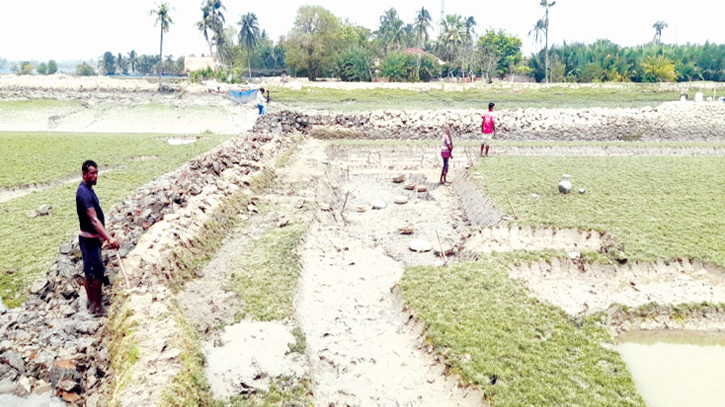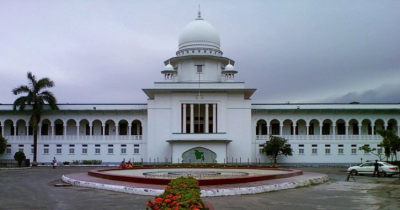
This encroachment in Mongla-Ghoshiakhali Channel not only threatens the government’s land but also obstructs the water flow of the channel’s banks and floodplains. Photo : Messenger
The rampant fish farming on the bank of the Mongla-Ghoshiakhali channel, through the illegal occupation of thousands of acres of government-owned land, has raised serious concerns regarding navigability and the ecological integrity of the area, particularly the Sundarbans and the Mongla port.
This encroachment not only threatens the government's land but also obstructs the water flow of the channel's banks and floodplains, exacerbating the challenges posed by climate change.
Environmentalist organizations and concerned citizens are alarmed by the apparent indifference and lack of vigilance from authorities such as the Bagerhat District Collector, Bagerhat Water Development Board, and BIWTA.
The Mongla-Ghoshiakhali channel, which is 27 km long, has already faced significant challenges due to climate change and man-made obstructions, leading to a loss of navigability. Prime Minister Sheikh Hasina intervened and initiated an excavation project costing approximately 500 crores to restore the channel's navigability.
To safeguard the channel's navigability, a 5 km area of the main channel was separated by a loop cut at Romjaipur point. However, the failure to mine this section has resulted in a narrow canal that extends across the Kaliganj area of Baradia, Chotadia, Kumarakhali Mauza of Mujibnagar, and Romjaipur points. This area has been prone to river erosion since the 1960s due to changes in the river's course. Despite being designated as government Khas Khatyan, the status of these lands is questionable, with allegations of corruption and irregularities in land management practices.
The encroachment by alleged landless and land grabbers, facilitated by corrupt officials, has resulted in the illegal acquisition of land through the preparation and recording of fraudulent documents. These individuals have also taken possession of private land that has been lost to the river and washed up on the other side. The lack of proper investigation into these matters has allowed such practices to continue unchecked.
At Mujibnagar Point, land grabbers have once again occupied the river banks and floodplains, constructing illegal embankments. Notable among these encroachers are Mizan Mallik of Gilatla, Sheikh Belal son of Sheikh Ilyas of Mujibnagar village, Sheikh Mukul son of Rustum Sheikh, Sheikh Shariful, Sheikh Saiful, and Sheikh Arif son of Sheikh Solaiman, as well as Mozaffar Hossain son of deceased Sheikh Mahatab. When confronted, these individuals have admitted to occupying government land and cultivating fish with dams, blaming a lack of enforcement for their actions.
Molla Abdus Sabur Rana, the member secretary of the Mongla-Ghoshiakhali Channel Raksha Sangam Committee, has expressed frustration with the lack of oversight from authorities, leading to the loss of valuable government land and the decline in the channel's navigability.
Rampal Upazila Executive Officer Rahima Sultana Bushra has promised to take appropriate action against illegal encroachments and protect the channel's navigability, acknowledging the challenges posed by a shortage of manpower.
The situation on the Mongla-Ghoshiakhali channel highlights the urgent need for effective land management and enforcement of regulations to protect government land and preserve the ecological balance of the area. Without immediate action, the future of the Sundarbans, the Mongla port, and the navigability of the channel itself remains uncertain.
Messenger/Disha








